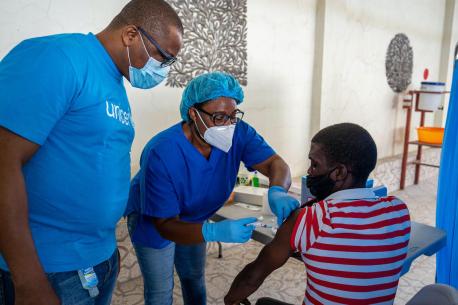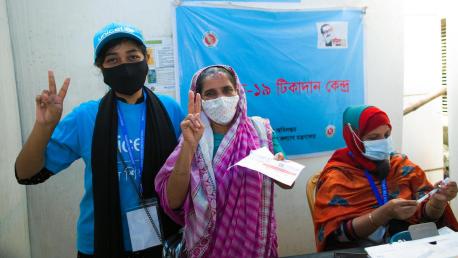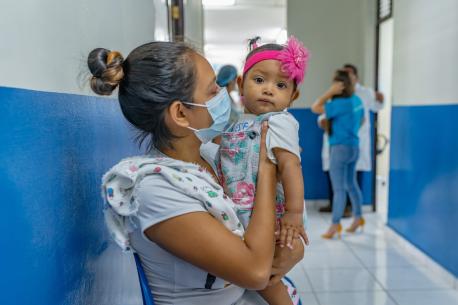
Haiti Starts Vaccinating Against COVID-19
With vaccine doses finally on hand thanks to UNICEF and COVAX, Haiti launches its emergency immunization campaign amid multiple crises in the country.
Half a million COVID-19 vaccine doses donated by the U.S government through the COVAX Facility landed in Haiti on July 14; two days later, in the face of rising insecurity in and around Port-au-Prince, vaccinators were administering them at select sites in the capital city's metro area.
The plan is to extend immunization efforts to other departments in order of urgency, starting with those most vulnerable to infection: frontline health workers, people aged 50 and older and those with preexisting conditions.

Alabrie Marie Myriam, a neonatal nurse, is vaccinated at Hôpital Saint-Damien/Nos Petit-Frères et Sœurs, Tabarre, Port-au-Prince, Haiti on July 24. © UNICEF/UN0493324/Fils Guillaume
“Now that I got vaccinated, I feel much safer to carry out my job and to protect children and their parents from COVID-19 infection,” said Alabrie Marie Myriam, a neonatal nurse at l’hôpital Saint-Damien (also known as Petit-Frere et Sœurs) in Port-au-Prince.
UNICEF teams have been on the ground in the country since the beginning of the pandemic, working with local partners nonstop to prepare for this moment. Efforts include strengthening the country's cold chain system by installing solar fridges to keep vaccines cold, among other measures. UNICEF is also focused on countering vaccine myths and misinformation and communicating the vaccine's benefits to the public.
Many challenges remain — rising violence due to the country's current political crisis have exacerbated existing social and economic woes, while complicating logistics for aid workers and potentially limiting access to communities in need. The ripple effects of the COVID-19 pandemic on families have led to increased food insecurity, and malnutrition rates among children are on the rise.

A nurse carries COVID-19 vaccines from a UNICEF solar-powered fridge to a hospital vaccination site in Port-au-Prince, Haiti. © UNICEF/UN0493315/Fils Guillaume
Support UNICEF's ongoing efforts to meet urgent needs of vulnerable children and families in Haiti. Donate today.
Top photo: Karl Marx Dossou, UNICEF Immunization Manager, oversees the COVID-19 vaccination rollout at Hôpital Saint-Damien/Nos Petit-Frères et Sœurs, Tabarre, Port-au-Prince, Haiti, on July 24. © UNICEF/UN0493313/Fils Guillaume
HOW TO HELP
There are many ways to make a difference
War, famine, poverty, natural disasters — threats to the world's children keep coming. But UNICEF won't stop working to keep children healthy and safe.
UNICEF works in over 190 countries and territories — more places than any other children's organization. UNICEF has the world's largest humanitarian warehouse and, when disaster strikes, can get supplies almost anywhere within 72 hours. Constantly innovating, always advocating for a better world for children, UNICEF works to ensure that every child can grow up healthy, educated, protected and respected.
Would you like to help give all children the opportunity to reach their full potential? There are many ways to get involved.




